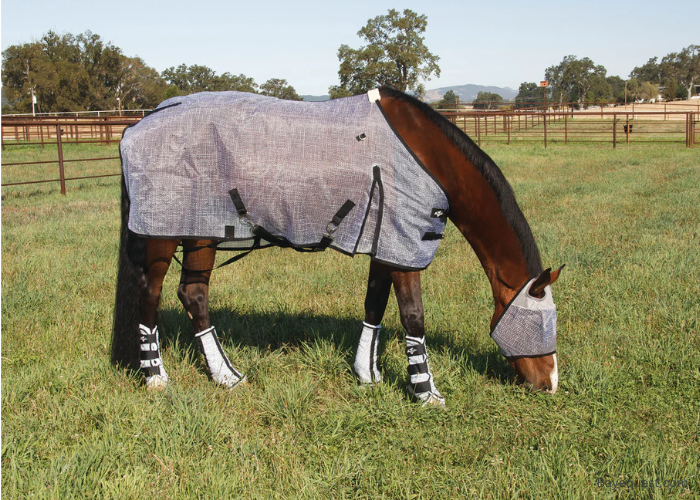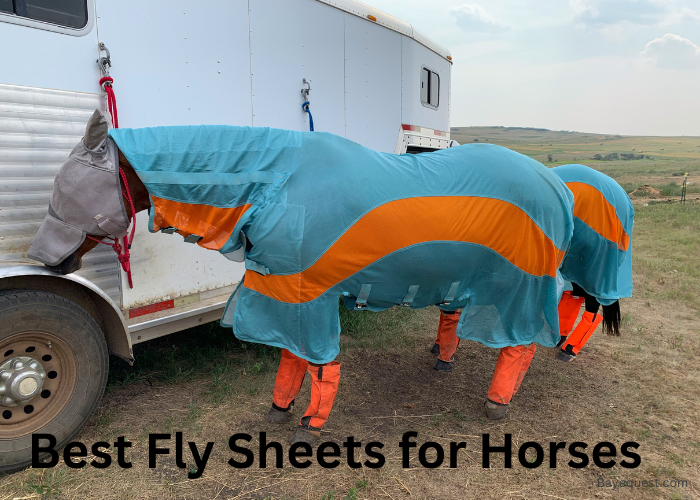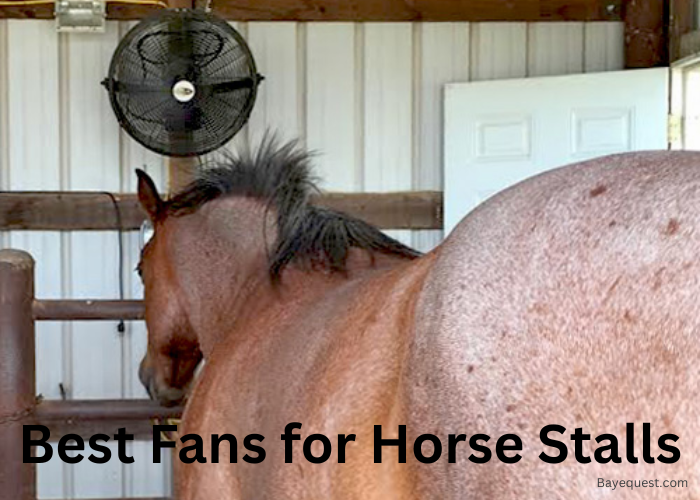Flies love your horse. But your horse hates them. These biting pests bring endless itching, stress, and frustration, and that’s where a good fly sheet saves the day.
I tested 13 of the best-rated options so you don’t have to. From budget picks to premium shields, I put them through their paces in the field.
One sheet stood tall above the rest, the Bucas Buzz-Off Full Neck Zebra. It’s my top pick for unbeatable protection and comfort.
Ready to see what else made the cut? Let’s chase those flies off for good.
Best Fly Sheets for Horses: Key Takeaway
- Best Overall Fly Sheets for Horses – Bucas Buzz-Off Full Neck Zebra
- Best Bang for the Buck – Shires Tempest Original Combo Fly Rug
- Best Comfortable Mesh Fly Sheet – TuffRider Comfy Mesh Horse
- Best Lightweight Fly Sheet – Mio Horseware Ireland Mio Fly Sheet
- Most Durable Fly Sheet – Kensington Protective Products Protective Sheet
- Best Fly Sheet for Sensitive Skin – LeMieux Arika Armour-Tek Fly Rug
- Best Multi-Adjustable Fly Sheet – Gallop Dual 5-Point Fly Rug and Neck Set
- Best Fly Sheet for Maximum Coverage – Amigo Bug Rug Plus Fly Sheet
- Best Horse Fly Sheet for Minis – Rhinegold Mini Fly Rug with Detachable Neck
- Most Stylish Horse Fly Sheet – Horseware Newmarket Plus
- Best Heavy-Duty Fly Sheet – WeatherBeeta ComFiTec Ripshield Plusk
- Most Breathable Fly Sheets for Horses- Standard Neck Comfy Mesh
- Best Detachable Neck Fly Sheet – Jeffers Equine Solaris
What is a Fly Sheet?
A fly sheet is a special blanket for horses. It protects them from flies, mosquitoes, and other biting bugs.
The sheet is made of lightweight mesh that lets air flow so your horse stays cool. Some fly sheets also block harmful sun rays to prevent sunburn.
Others have extra coverage for the neck and belly. Fly sheets help stop your horse from itching, biting, or kicking at pests.
They reduce stress and protect the horse’s skin from irritation and disease. With a good fly sheet, your horse can graze or rest in peace.
It’s a simple way to keep them happy.
Why Use a Fly Sheet on Your Horse?
A fly sheet helps keep your horse calm and healthy. It shields your horse from biting flies, mosquitoes, and other bugs.
This stops skin irritation, itching, and painful bites. A fly sheet also protects against sunburn and harsh UV rays.
Some horses have sensitive skin and need extra care. Fly sheets also lower stress and help your horse focus on grazing or training. They can even help prevent insect-borne diseases.
With a good fly sheet, your horse stays cool, clean, and comfortable. It’s an easy way to give your horse a break from the constant bother of biting pests.

What to Look for in a Fly Sheet
Flies can drive your horse crazy, but a good fly sheet can fix that.
Let’s break down how to pick the right fly sheet:
Fit. A good fit is key. It should be snug but not tight. A bad fit can cause rubbing and sores.
Material. Look for strong, breathable mesh. This lets air flow but keeps bugs out.
Coverage. More coverage means better protection. Neck and belly panels add extra defense against biting pests.
Straps and closures. Strong, adjustable straps keep the sheet in place. This stops it from slipping or twisting.
Soft lining. A smooth lining helps prevent rubbing on the shoulders and withers.
UV protection. Some sheets block harmful sun rays. This can help prevent sunburn, especially on light-colored horses.
Durability. If your horse is playful or active, choose a tough fabric that won’t tear easily.
Ease of cleaning. Fly sheets get dirty fast. Pick one you can wash easily.
Best Fly Sheets for Horses: Product Review
1. Best Overall Fly Sheets for Horses – Bucas Buzz-Off Full Neck Zebra
I was impressed by the Bucas Buzz-Off Full Neck Zebra fly sheet. The silk-feel lining felt soft and kept my horse’s coat smooth and shiny.
Its breathable fabric worked perfectly on warmer days, stopping my horse from overheating. I also liked the rip-stop outer, which held up well to playful rolls and kicks.
You can choose different weights depending on what your horse needs, which is a nice bonus. I tried the high-neck style, and it gave extra coverage while keeping bugs away from the neck.
Sure, it’s pricey, but the quality and features make it worth every penny. If you want strong, flexible, and all-around bug protection, this fly sheet is worth considering.
Pros
- Breathable and cool for hot days.
- Strong fabric that resists tears.
- Comes in different weight options.
Con
- It is expensive
2. Best Bang for the Buck – Shires Tempest Original Combo Fly Rug
The Shires Tempest Original Combo Fly Rug is a solid choice if you’re on a budget. It’s the most affordable fly sheet in this lineup, yet it still performs well.
The super lightweight design won’t weigh down your horse, and the breathable mesh allows fresh air to circulate. It features moisture-wicking properties to prevent sweat from accumulating, while the mesh panels create a microclimate to ward off chills when the wind picks up.
Its adjustable straps help you get a snug, secure fit. If you’re looking for a fly sheet that strikes a balance between price, comfort, and function, this one is worth considering.
Pros
- Very budget-friendly option.
- Helps control heat and moisture.
- Adjustable for a better fit.
Con
- Works best for smaller breeds only.
3. Best Comfortable Mesh Fly Sheet – TuffRider Comfy Mesh Horse
The TuffRider Comfy Mesh Horse Fly Sheet is a great choice if you’re looking for comfort and flexibility. It has a roomy 72-inch chest size and fits horses of all breeds.
The lightweight mesh lets air flow through and keeps bugs away. It also features adjustable straps that help you achieve the perfect fit, while belly and leg straps provide added security.
Many owners report that it lasts for several seasons and offers good value for money. The breathable design also keeps horses cool and relaxed.
Still, the material can rip if your horse is rough on sheets. If you’re looking for a comfortable and easy-to-use option, give this one a try.
Pros
- Lightweight and easy to adjust.
- Good bug protection.
- Works for many horse sizes.
Con
- Fabric may tear with rough use.
4. Best Lightweight Fly Sheet – Mio Horseware Ireland Mio Fly Sheet
Mio Horseware Ireland Mio Fly Sheet is a great lightweight option for your horse. It features a tough 600 denier polyester outer shell that is waterproof, breathable, and durable.
This 0g turnout sheet is perfect on its own in rainy weather or can be layered when conditions turn harsher. The shine-enhancing polyester lining helps maintain your horse’s coat and keeps warmth in.
Many customers love how true to size it fits and praise its well-made design. The color looks smart and modern.
If you’re looking for a lightweight sheet that protects against rain and keeps your horse looking shiny, this one is worth considering.
Pros
- Strong and waterproof outer shell.
- Fits true to size.
- It keeps your horse’s coat smooth.
Con
- Best for mild to moderate weather
5. Most Durable Fly Sheet – Kensington Protective Products Protective Sheet
If you need maximum strength and protection, this fly sheet is the one to try. It blocks 73% of UV rays, helping prevent sunburn and coat bleaching.
The sturdy mesh is tough enough to keep flies and pests far away. What makes it stand out is the unique grooming mesh that gently polishes your horse’s coat with every step. That’s a rare feature in fly sheets.
The non-heat-transferring fabric also keeps your horse cool, even in strong sunlight. Built to handle the roughest use, this sheet is built to last.
If you’re looking for durability and smart design, consider giving it a try.
Pros
- Strong UV protection.
- Naturally grooms the coat.
- Total bug barrier.
Con
- Feels a bit heavier than other sheets.
6. Best Fly Sheet for Sensitive Skin – LeMieux Arika Armour-Tek Fly Rug
Sensitive horses deserve the best, and this fly rug delivers. It has a super tough 1200 denier waterproof outer and a 200g heavyweight thermobonded fill.
The 210T anti-static lining helps prevent rubbing, perfect for horses with delicate skin. A smart 45° angled T-bar front closure spreads pressure evenly across the chest and shoulders, reducing sore spots.
The lower skirt moves freely, giving your horse more room to stretch and roll without pulling tight. There are even attachments for rug liners, allowing you to adjust the warmth in any weather.
If your horse struggles with rubbing or irritation, this award-winning design is definitely worth considering.
Pros
- It’s gentle on sensitive skin.
- Strong, weatherproof build.
- Flexible, roomy design.
Con
- It may feel bulky in warm weather.
7. Best Multi-Adjustable Fly Sheet – Gallop Dual 5-Point Fly Rug and Neck Set
This fly rug is a strong pick if you want lots of adjustments. The fine-weave polyester mesh molds to your horse and stays light to keep them cool.
Reinforced nylon lining at the shoulders helps stop rubbing and keeps the fabric from stretching out. Fleece at the withers protects the mane.
The twin-buckle chest, adjustable surcingles, and adjustable leg straps make it easy to achieve a good fit.
It also blocks up to 60% of UV rays to prevent sunburn and coat fading. The stainless steel hardware resists rust. While the straps can be tricky for some, the overall value and comfort are impressive.
Pros
- Easy to adjust for many fits.
- Blocks harmful UV rays.
- Soft fleece helps protect the mane.
Cons
- Belly straps can be too long.
- Mixed reviews on durability.
8. Best Fly Sheet for Maximum Coverage – Amigo Bug Rug Plus Fly Sheet
For horses that need full head-to-tail protection, this fly sheet is a winner. The Amigo Bug Rug Plus offers strong fly and UV defense with a close-weave mesh that blocks up to 65% of UV rays.
It comes with a detachable hood, giving you flexible coverage depending on the day. The silky lining helps reduce friction on the mane and tail, keeping hair smooth and healthy.
An extra-long tail flap adds even more shield from biting bugs and sunburn. The fit stays secure thanks to its straight front closure, front leg arches, and crossed surcingles.
If you want maximum coverage and comfort, this fly sheet is worth checking out.
Pros
- Excellent UV and bug protection.
- It features a detachable hood, adding flexibility.
- Extra tail coverage prevents sunburn.
Con
- It may feel bulky on smaller horses.
9. Best Horse Fly Sheet for Minis – Rhinegold Mini Fly Rug with Detachable Neck
Mini horses deserve top-notch fly protection too, and this sheet does the job well. Made in mini sizes, it offers a fine mesh barrier that keeps flies and bugs away while staying light and breathable.
The detachable neck cover offers options for everyday. A satin lining at the chest helps protect the coat and stops rubbing or irritation.
There’s also a cotton toweling spine to wick away sweat and keep your mini cool. Cross surcingles, double chest straps, a front shoulder gusset, and a tail guard all enhance coverage and comfort.
If you want to keep your mini friend happy and itch-free, this is a smart pick.
Pros
- Lightweight mesh keeps your little horse cool and bug-free.
- Detachable neck cover adds flexible coverage when needed.
- Satin lining at the chest helps prevent rubbing or hair loss.
- Secure straps and a tail guard keep everything in place, even during turnout.
Con
- The neck cover might shift if your mini is extra playful.
- Only made for minis, so won’t work for bigger horses.
10. Most Stylish Horse Fly Sheet – Horseware Newmarket Plus
If you want style and function in one package, this fly sheet delivers. The Horseware Newmarket Plus features a woven polyester mesh with a PVC coating, making it both durable and breathable.
It gives solid fly and UV protection, keeping your horse safe and comfortable. A silky lining on the mane, shoulders, and tail prevents rubbing and keeps hair smooth.
The detachable hood and extra-long tail flap offer full coverage from bugs and sun. Front leg arches boost freedom of movement, while secure closures and surcingles keep everything in place.
If you love a sharp-looking, protective, and practical fly sheet, this one is worth a look.
Pros
- Stylish and well-made.
- Covers horse from head to tail.
- Reduces friction to protect hair.
Con
- Premium price may not fit every budget.
11. Best Heavy-Duty Fly Sheet – WeatherBeeta ComFiTec Ripshield Plusk
Built for tough conditions, this fly sheet is a true workhorse. The WeatherBeeta ComFiTec Ripshield Plus features a durable fine mesh outer with a strong 1200 denier cross-hatch weave that resists tears and withstands daily wear.
A smooth 210T nylon lining protects the mane, shoulders, and tail from rubbing. The removable neck cover and boa fleece at the withers add comfort and flexibility.
A traditional side gusset lets your horse move freely, while the full wrap tail flap gives extra coverage from biting bugs. The belly wrap and leg straps are fully adjustable for a secure fit.
If you need heavy-duty, long-lasting protection, this is worth trying.
Pros
- Super tough and tear-resistant.
- Breathable and comfy for daily wear.
- Stays looking good after washing.
Con
- Slightly heavier than basic mesh sheets.
12. Most Breathable Fly Sheets for Horses- Standard Neck Comfy Mesh
If breathability tops your list, this fly sheet delivers. The Standard Neck Comfy Mesh uses a fine-weave polyester mesh that molds to your horse and keeps them cool.
It has a reinforced nylon lining at the shoulders that helps prevent rubbing and prevents the sheet from overstretching. Fleece at the withers protects the mane from damage.
The lightweight yet tough mesh blocks up to 60% of UV rays and shields against sunburn and coat fading. Adjustable surcingles, a twin buckle chest, and leg straps help create a secure fit.
Stainless steel hardware resists rust and adds durability. If you’re looking for breathable, budget-friendly protection, this is worth considering.
Pros
- Very breathable and lightweight.
- Protects against UV and sunburn.
- Good value for the money.
Cons
- Straps can come undone.
- Mixed reviews on durability.
13. Best Detachable Neck Fly Sheet – Jeffers Equine Solaris
This fly sheet is a smart choice if you want full coverage with flexibility. The Jeffers Equine Solaris uses lightweight, breathable mesh that keeps air flowing and your horse cool in warm weather.
The detachable neck cover gives added protection from ears to tail, perfect for indoor or outdoor use. Adjustable chest straps, crossed belly straps, hind leg straps, and a tail flap help you get a secure, custom fit.
Shoulder gussets let your horse move freely without pinching. The durable, tear-resistant fabric holds up well in turnout or pasture.
If you want a versatile sheet that covers every need, give this one a serious look.
Pros
- Breathable mesh keeps horses cool.
- Detachable neck adds flexible coverage.
- Fits a wide range of horse sizes.
Con
- Gray color may show dirt easily.
How to Measure Your Horse for a Fly Sheet
Don’t let sizing trip you up. A perfect fly sheet fit begins with a quick and easy measurement. Here’s how to get it right the first time.
Step 1: Start at the center of the chest. Place your measuring tape right at the point of the chest where the fly sheet will begin.
Step 2: Measure to the tail. Run the tape along the side of your horse, keeping it level, all the way to the center of the tail.
Step 3: Check the shoulder. Make sure there’s enough room for free movement and no tight spots around the withers.
Step 4: Double-check. Always measure twice to be sure.
Tips for Using and Maintaining Fly Sheets
Keeping your horse comfy and protected takes more than just buying a great fly sheet. Proper use and maintenance make a huge difference.
Always inspect your fly sheet before putting it on. Look for any rips, worn straps, or broken buckles. A damaged fly sheet can rub or even injure your horse.
Next, check the fit. It should be snug enough to stay put but never too tight. Adjust straps carefully to prevent shifting or slipping.
Cleaning matters, too. Shake off dirt and loose hair often. When it’s time for a deeper wash, use a gentle cycle or hand wash, as indicated by the label. Let it air dry fully before putting it away.
Finally, store your fly sheet in a dry, clean spot. That prevents mold, mildew, and foul smells.
With these simple habits, your fly sheet will last longer and keep your horse happy and comfortable through every buggy season.
Fly Sheet Fabric Technology
Fly sheet fabric technology has come a long way. Today’s fly sheets utilize advanced mesh fabrics that are strong and lightweight.
The fine weave blocks flies and biting bugs while letting air move through. This keeps your horse cool and stops sweating.
Some fly sheets also have UV-blocking coatings. These protect your horse from sunburn and fading. Other fabrics feature smooth linings to prevent rubbing and maintain the coat’s shine.
Modern fly sheets may also have waterproof treatments or tear-resistant weaves. These features enable them to last longer and withstand rough play in the pasture.
In short, fly sheet fabric technology strikes a balance between breathability, durability, and comfort to keep your horse safe and happy.
Interesting read: How to Get Rid of the Flies.
FAQs
Can I ride in a fly rug?
No, you should not ride in a fly rug. Fly rugs are made for turnout or stable use, not for riding. They may shift, bunch up, or get caught on tack while you ride, which could be unsafe. If you want fly protection while riding, look for a special riding fly sheet instead.
Can I leave a fly rug on overnight?
Yes, you can leave a fly rug on overnight if needed, but check your horse first. Make sure the rug fits well, has no tears, and isn’t rubbing the skin. Also, inspect for trapped insects. A good-fitting, breathable fly rug is safe to use overnight in most situations.
Conclusion
Flies don’t stand a chance with the right sheet. Your horse deserves calm days, cool skin, and a happy coat.
From budget picks to top-of-the-line champions, these fly sheets deliver freedom from bites and burns. I’ve tested and compared them, so you don’t have to guess.
Pick one that fits your horse’s needs and style. Trust me, your horse will thank you with peace and sweet relief.
No more stomping, swishing, or stress. Just calm, cool, and collected. Ready to send those flies packing? Your perfect fly sheet is waiting.







